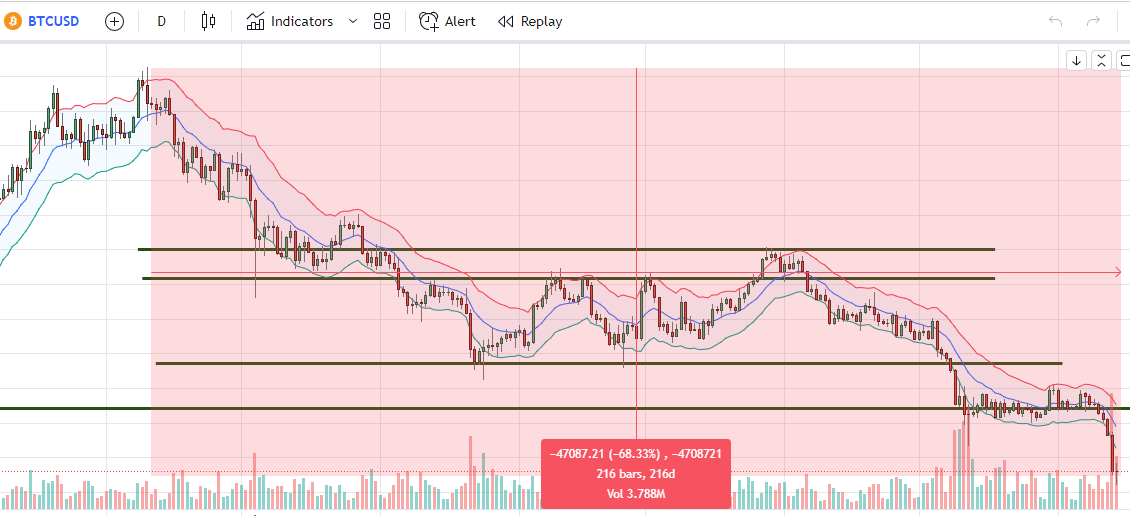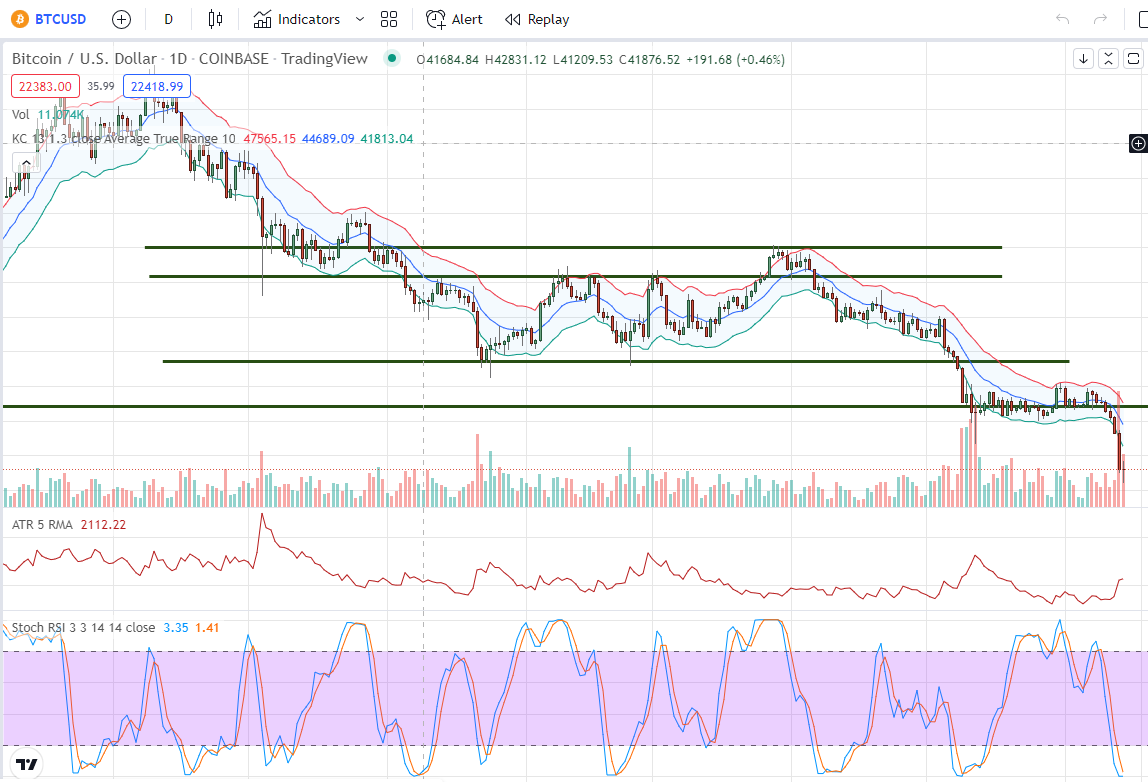On Monday (June 13th 2022), bitcoin fell below $23,000 for the first time since December 2020, as investors dumped crypto amid a broader sell-off in risk assets.
Meanwhile, a crypto loan company named Celsius has put a halt on its customers' withdrawals, raising worries of a market-wide meltdown.
With runaway inflation continuing and the Federal Reserve anticipated to raise interest rates this week to contain increasing prices, macro issues are contributing to bearishness in the crypto markets.
On Monday, bitcoin fell below $23,000 for the first time since December 2020, as investors dumped crypto amid a broader sell-off in risk assets.
Meanwhile, a crypto loan company named Celsius has put a halt on its customers' withdrawals, raising worries of a market-wide meltdown.
According to CoinDesk data, the world's largest cryptocurrency, bitcoin, has fallen below the $23,000 threshold. Bitcoin dropped almost 17% at one time, trading at roughly $22,764. Some of those losses were recouped later, and bitcoin was trading at $23,351 at 4 p.m. on Wall Street, down 15%.
Over the weekend and into Monday morning, the whole cryptocurrency market had lost more than $200 billion. According to CoinMarketCap data, the cryptocurrency market capitalization dipped below $1 trillion for the first time since February 2021 on Monday.
With rampant inflation continuing and the US Federal Reserve anticipated to raise interest rates this week to contain increasing prices, macro issues are contributing to bearishness in the crypto markets.
The Nasdaq, which is heavily weighted in technology, fell dramatically last week. Bitcoin and other cryptocurrencies have a history of being linked to equities and other risky assets. When these indices decline, so does crypto.
"Since November 2021, attitude has shifted dramatically as a result of the Fed's rate hikes and inflation control." "Because the FED may need to finally address the demand side to limit inflation, we could be looking at a recession," Vijay Ayyar, vice president of corporate development and international at crypto exchange Luno, told CNBC.
"All of this suggests that the market hasn't really bottomed, and we're unlikely to see bullishness return unless the Fed is able to take a pause."
 Bitcoin had plummeted roughly 80% from its previous record high in previous bear markets, according to Ayyar. It is currently down roughly 63 percent from its previous all-time high in November.
Bitcoin had plummeted roughly 80% from its previous record high in previous bear markets, according to Ayyar. It is currently down roughly 63 percent from its previous all-time high in November.
"Over the next month or two, we could see considerably lower bitcoin pricing," Ayyar added.
Celsius is 'fueling the fire.'
Since mid-May, when the so-called algorithmic stablecoin terraUSD, or UST, and its sister cryptocurrency luna crashed, the crypto market has been on edge.
The market is now concerned about a crypto loan firm named Celsius, which said on Monday that it is halting all withdrawals, swaps, and account transfers "due to extraordinary market conditions."
Celsius, which claims to have 1.7 million customers, advertises to its consumers that the platform may provide an 18% yield. Celsius is where users deposit their cryptocurrency. After that, the crypto is leased to institutions and other investors. As a result of the revenue earned by Celsius, users receive yield.
However, the cryptocurrency market downturn has harmed Celsius. According to the company's website, it had $11.8 billion in assets as of May 17, down from more than $26 billion in October of previous year.
According to CoinGecko, CEL, Celsius' own coin, has dropped more than 50% in the last 24 hours. Investors are afraid about a broader crypto market contagion.
"The current temperature," Ayyar remarked, "is absolutely giving fuel to the fire."
"While the markets were already under pressure from inflation fears and interest rate hikes, such contagion events in crypto might result in outsized losses, given the market's close interconnectedness these days with a range of interconnected protocols and businesses."
As good as it gets. Or maybe not. According to the Wall Street Journal, bitcoin took off in the fall of 2020 as a result of a resurgence in day trading amid the epidemic and the search for assets that could generate profits while bond yields fell to historic lows.
In November of last year, the cryptocurrency reached new highs. Since then, it has lost 65 percent of its value versus the dollar, defying proponents' forecasts that it would replace gold as a hedge against inflation and market volatility.
The Journal quoted Jeff Mei, chief marketing officer at blockchain technology solutions firm ChainUp, as saying, "Risky and highly liquid cryptocurrencies are frequently the first to be traded in a market selloff."
Sources:
https://www.cnbc.com/2022/06/13/bitcoin-btc-falls-as-market-focuses-on-celsius-issue-fed-rate-hike.html
https://www.deseret.com/u-s-world/2022/6/13/23165813/bitcoin-crypto-crash-hits-new-low-cryptocurrency-market-loses-200-billion-ethereum
Check out our e-books in the Wealth category:
https://wesleyenterprises.groovepages.com/lpwealthebooks
Check out our partner programs in the Wealth category:
https://wesleyenterprises.groovepages.com/lpwealthpartnerprograms





